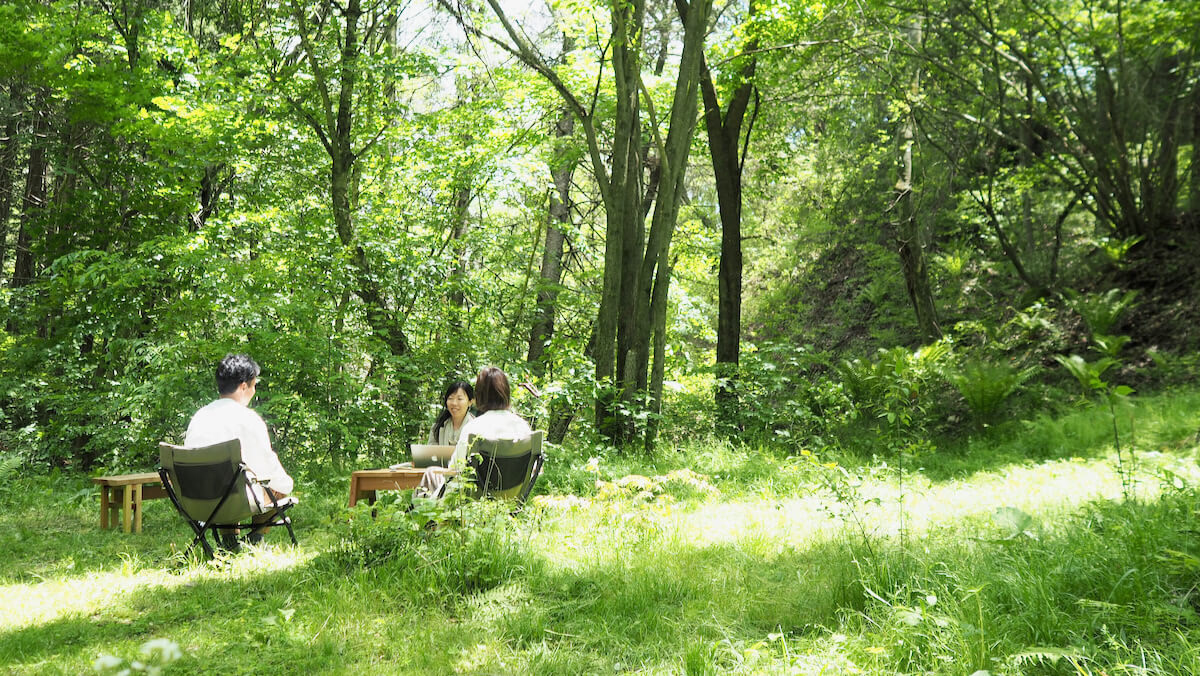長野県佐久市でセルフビルドパートナーとして活動する「えんがわ商店」渡辺正寿さんに、園芸分野で同じような仕事がしたいと考えているモノサス社員の馬場はるかさんがお話を伺う本企画。
前編ではおふたりに、「自分でつくりたい」人のサポートを仕事にしようと思った背景を語っていただきました。後編ではいよいよ、馬場さんから渡辺さんに質問を投げかけてもらいます。
渡辺正寿(わたなべ・しょうじ)さん
1981年栃木県生まれ。神奈川大学建築学科卒。大手ハウスメーカーで3年、長野県の工務店で5年働いた後、建築業界を離れて異業種を転々としていたときに「自分でつくる」たのしさに出会い、2015年に「えんがわ商店」を創業。「セルフビルドパートナー」として、「自分でつくりたい」人々のサポートを行う。
馬場はるか
1994年宮城県生まれ。宮城大学デザイン情報学科卒。造園会社勤務を経て、2019年にモノサス入社。コーダーとして働きながら、「園芸担当」として代々木本社の中庭の手入れを行う。「好きなことを探求する」社内プロジェクトでマリオネット(愛称:ポルタ)を購入し、ショートフィルムも公開中。
みんな、答えがほしいわけじゃなくて、一緒に悩んでほしいのかもしれない
馬場
さっき渡辺さん、「(セルフビルドを)みんなもっとやったらいいのにな」と思ったとおっしゃっていたじゃないですか。実際にやった人は、みんなたのしんでくれましたか?
渡辺
はい。ただ、結構歯を食いしばって取り組むことだなと思っています。そんなに簡単じゃないし、うまくいかないことも多いし、「いつ終わるの?」「これなら人に頼んだほうが早かったし安上がりだった」って夫婦喧嘩に発展しちゃうこともある。途中はつらいことの方が多いかもしれません。
でも、やりきると違うんですよね。最後は笑顔というか、「あ〜つらかった」って苦笑いしちゃう。その感じが僕は好きなんです。そこでようやく、「わたしでもできるんだ」と満たされて、「大変だったけどやってよかった」って思ってもらえる。
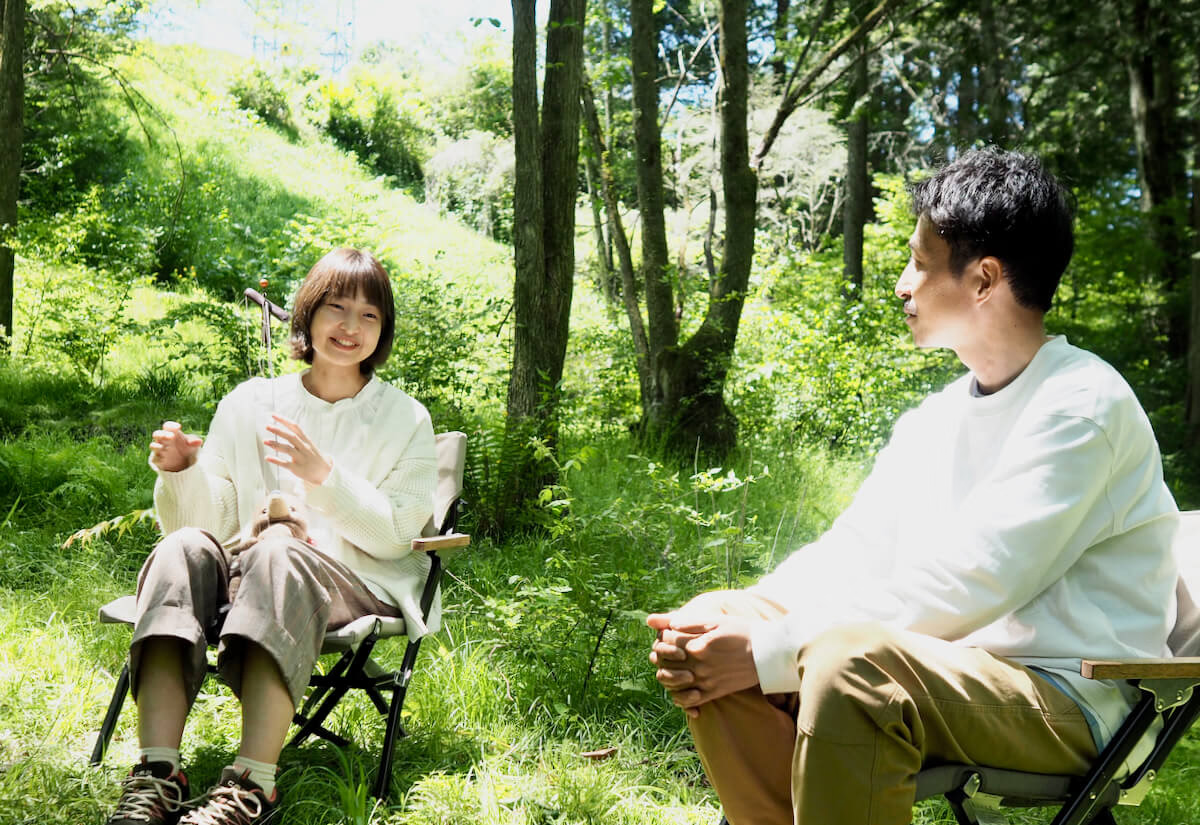
取材は長野の森のなかで行いました
馬場
相手が途中で投げ出しちゃって、たのしさが伝わらないまま終わってしまったことはありますか?
渡辺
これまでは請負の側面が大きかったので、長引くときはこちらがどんどん押して強引に終わらせていたところがありました。だから、気をつけないといけないのはこれからですね。「サロンメンバーのプロジェクトをみんなでサポートする」という形になるので、続けるかやめるかはその人次第になる。途中で投げ出してほしくはないけど、無理強いするものでもないので……。
でも、サロンを通して自分以外にがんばっている人たちの姿が見られたり、励ましあえたりするのは大きいと思います。セルフビルドは孤独な闘いになりがちだから。
馬場
わたしは、自分自身が土いじりをしていてすごくたのしくて、「みんなやればいいのに」と思う一方で、「はたしてみんなも楽しいのかな」という気持ちがあって、勧められずにいることが多いんです。
渡辺
もちろん、全員がたのしめるわけではないと思います。だから、最初に相談をいただいたときに、「本当に自分でやりたいと思っているかどうか」は確認するようにしています。やりたくない人はやらない方がいい。でも、「やりたいけどできるかな」と思っているならやった方がいいし、そういう人はいると思う。

僕も、建築のことなら初めての作業でも何となくイメージできるけど、庭となるとよくわからないんですよ。漠然と「もうちょっと素敵になるといいな」という思いはあるけど、植物の名前も、道具も、何から始めたらいいかもわからない。だから、相談に乗ってくれる人がいるとすごくありがたいです。
馬場
その「わからない」がわからなくて。「高い木の周りに中低木や下草があって、そういう島をいくつかつくるとお庭に統一感ができるといいですよ」とか、そういうアドバイスがほしいということですか?
渡辺
うーん、そもそも自分がどうしたらいいのかわからないというか。会話をしたいかもしれないですね。本や動画でなんとなく情報を得ることはできても、実際に自分の庭をここからどうしたらいいのかがイメージできないんです。でも、造園屋さんに相談すると、「ここはこうしてこうやって、お見積りは〜」という話になりますよね。そうじゃないんだよなって。
馬場
これまで知り合いのお庭をお手伝いさせていただきながら、わたしにどういうサポートができるんだろうと悩んできたのですが、いま「会話をしたい」という言葉を聞いて、「あ、たしかに話をするってすごく大事だな」って思いました。
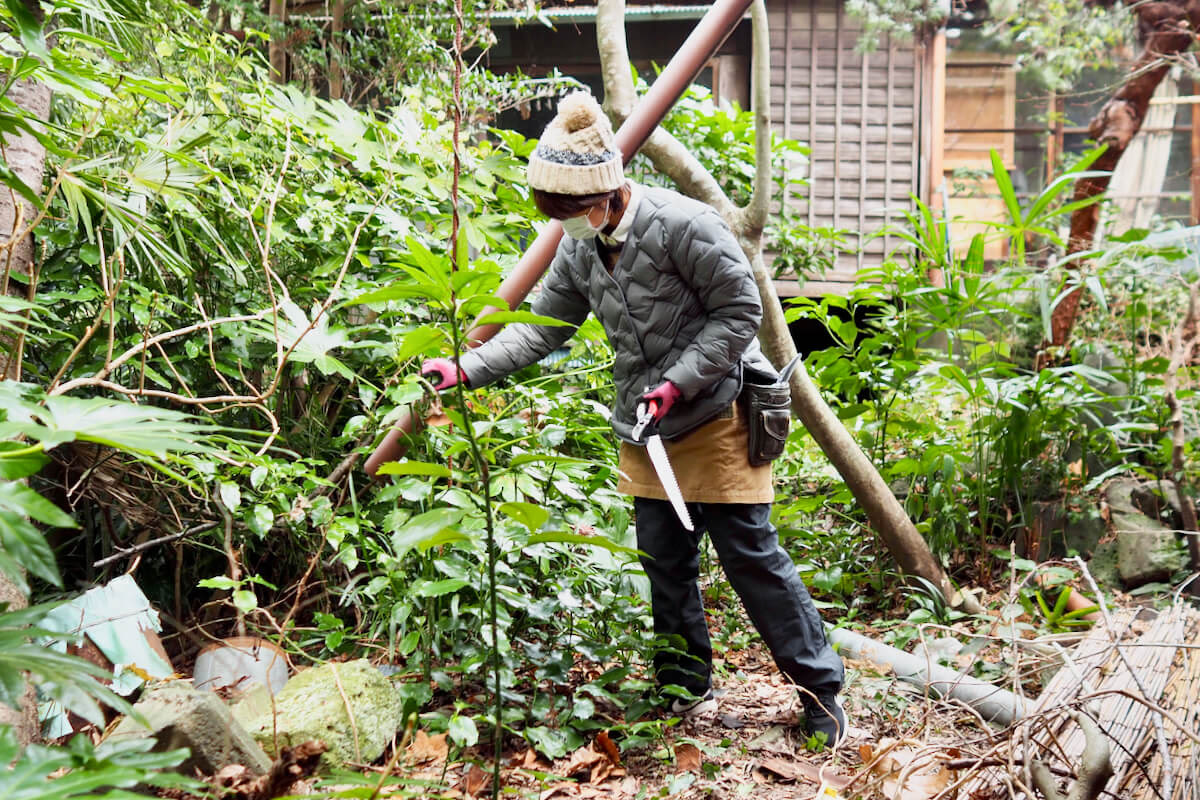
植物、そして庭全体の様子をみながら、作業を進めていく
渡辺
僕は職人として現場で働いた経験がないままにこの仕事を始めたから、最初に依頼してくれた方には「本当に経験ないし何も知らないですよ」とお伝えしていました。「だから、一緒に考えていきましょう」と。そうしたら、かえって喜んでもらえたんです。
もちろんプロとしての意見を求めている人もいると思いますが、一緒に悩んでほしいというか、「ここに悩んでいて……」ということをまずは聞いてほしい、という人は多いんじゃないかって思います。僕自身がそうだから。
お客さんの「やりたい」気持ちに寄り添うために
馬場
林さん宅の庭づくりでは、わたしから作業を提案することもあるけど、林さんが「今日はこれをやりたいな」と言ってくださって一緒に動くことが多いんです。「まずはこっちを先に手を入れたほうがいい」とか、「この時期にはこれをやらないといけない」という作業もあるんですけど、やっぱり本人がいま一番気になっていることに取り組むほうがたのしいし、臨機応変に進めていくのがいいのかなって思っています。
渡辺
そうですね。僕も工務店のやり方が型として染み付いているので、「まずは図面を書きましょう」と言いがちなんですけど、「いいから、もうつくり始めたい」という人もいます。一番気持ちが熱いときに手を動かしてみることって大事なので、それはそれでいいと思います。一方で、図面の重要性もきちんと伝えるようにしています。基本のセオリーや、やろうとしていることのメリットとデメリットを伝えて、そのうえで選んでもらう。
— 「相手のやりたいことに寄り添う」というスタンスを取ったときに、やりたいことがすごくぼんやりしていたり、途中でコロコロ変わったり、という難しさがありそうですね。おふたりはそういうときどうしますか?
馬場
わたしはまだ経験が少ないので何とも言えませんが……植物も人と同じように生きているじゃないですか。だから、見ていると気になってしまうんですよね。もしどんなお庭にしたいのかイメージができていなかったら、「とりあえずお手入れしましょう」と言っちゃうかもしれません。
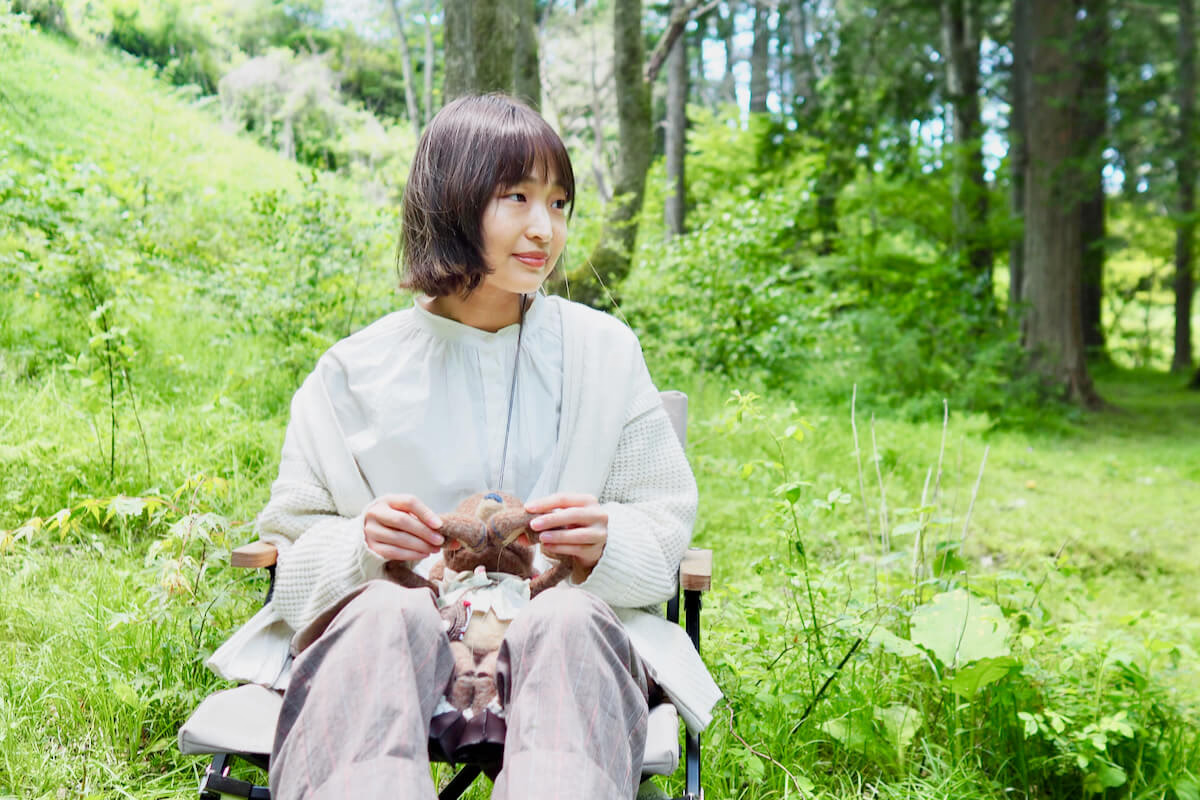
一緒に話を聞いているのは、相棒であるマリオネットのポルタ
実際に植物に触れて枝を切ったりしていくと、見え方ががらりと変わるんです。「遠くで見ている分には綺麗だけど、近くで見ると混み合っていて光が届いていないな」とか、「地面がかたいんだろうな」とか。
植物が弱っていたら気になってしまってお庭全体の計画を立てるどころじゃなくなっちゃうし、そうやって手を入れていくと解像度が上がっていって、「ここにこの植物があるといいな」とだんだん見えてきます。だから、まずは目の前のことから一緒に取り組むと思います。
渡辺
いまの馬場ちゃんの「植物も人も生きている」という言葉に、なるほどと思いました。本当に、作業に入ると変わるんですよね。いろんなことが見えるようになるから、途中でまったく違う形にしたいと言われることも結構ある。でも、それが自分でやるメリットだと思うんですよ。建築は要素が多いから、最初から決めきるのは本来難しい。でも、プロにお願いしてしまうと、なかなか途中で方向転換できないでしょう。それが、セルフビルドの場合は自分の責任で変えられますからね。
— 手を動かしながら柔軟に変えていくのですね。
渡辺
カウンセラーの方から聞いたのですが、「結局あなたは何がやりたいんですか」と聞かれると、相手はプレッシャーを感じて心を閉ざしてしまうらしいんです。僕は結構言ってしまっていたなと思って反省しました。
だから、最近は相手から言葉が出るのを待ちつつ、「僕はこれが好きです」「僕だったらこうします」という意見も気軽に言うようにしています。あくまで自分の意見として。そうすると、相手も「いや、わたしはそれ好きじゃないかも」と、自分の好き嫌いが出てくる。
あと、「思い描いているものは頭の中にあるんだけど、表現できない」場合もありますね。そういうときは、iPadで絵を描いたり、写真を見せたりして「こういうことですか」と確認していく。イメージを具体的な言葉や絵に落とし込んで、関わる人に伝えることが僕の大事な仕事だと思っています。

馬場
お客さんの「やりたい」という気持ちが続くように心がけていることはありますか?
渡辺
メンバーの方にはご自身でプロジェクトを立ち上げてもらうのですが、なかなか進まないこともあるので、週に1回1時間Zoomで打ち合わせを重ねるオプションプランを用意しました。その場で図面を書いたり見積もりをつくったりして、少しでも作業を前に進めるんです。不安を吐き出してもらうだけでもいい。それだけで随分違いますよ。
何もしないまま1ヶ月とか空いてしまうとどうしても気持ちが離れて「やっぱり無理かも」「もういいか」となってしまう。だから、継続的にコミュニケーションを取って、ちょっとずつでも進めていくのはすごく大切で、そういう時間を提供するだけで仕事になると思います。
どうすれば、「自分でつくる」をサポートすることを仕事にできる?
— 渡辺さんはオンラインサロンという形を取っていますが、馬場さんはどんな仕組みでサービスを届けようという構想はありますか?
馬場
そこに一番悩んでいて……。「そもそもお金になるのかな」とか、「どうしたらわたしがたのしいと思えることやできる範囲と、お客さんが求める範囲が重なるかな」とかを探っている感じです。
渡辺
僕がえんがわ商店を始めたころの失敗談を語るとしたら、自信がなくて料金を安く設定してしまったことです。それによって、お客さんからいろいろ求められたときに「こんなに安くやってあげているのに、もっと求めてくるんだ」という気持ちになってしまったことがあって。料金設定を見直したら、「これだけいただいているんだからもっとやってあげたいな」という真逆の気持ちになりました。
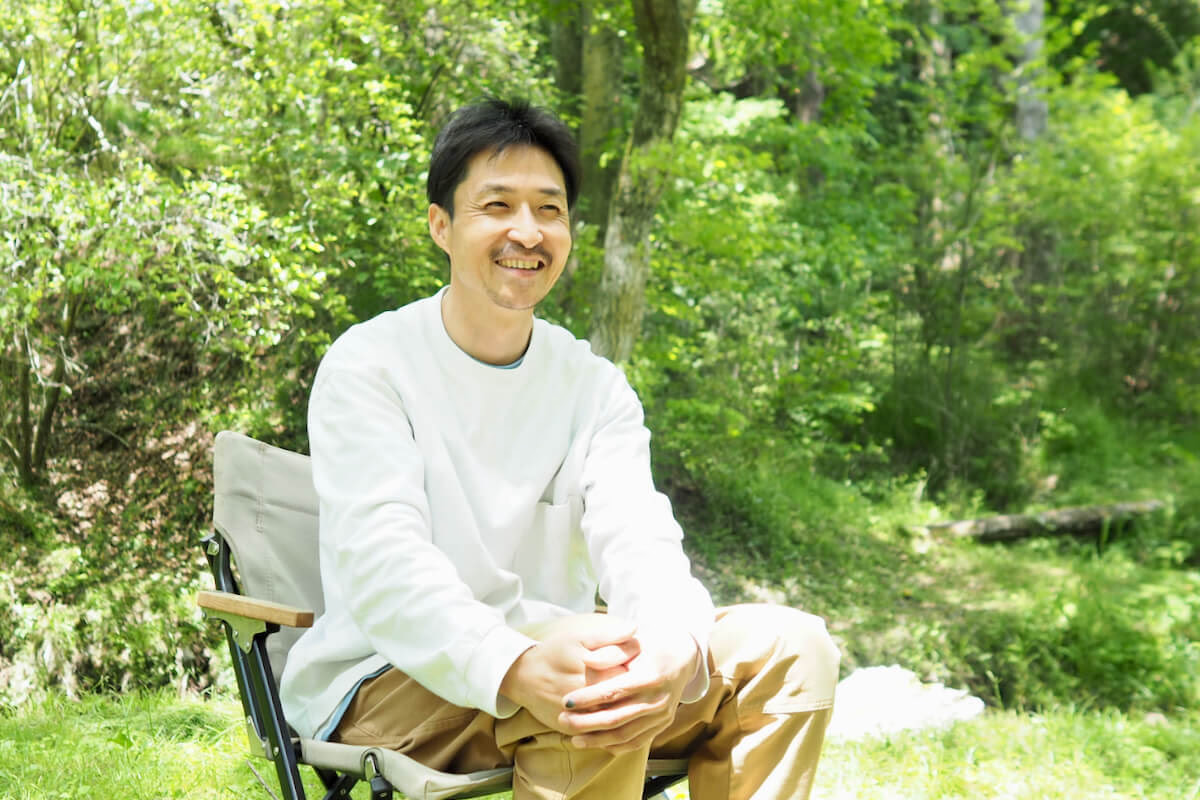
あと、自分ひとりで全部やろうとしていたときは、複雑な相談を受けたときに「俺、できるかな」とプレッシャーを感じていました。でも、自分ができないことは信頼できる職人さんに任せればいいやと思ったらすごく気が楽になって、相談の内容をおもしろがれるようになったんです。
だから、馬場ちゃんの考え方に共感してくれる職人さんを味方につけるといいかもしれない。できることの範囲がすごく広がるはずです。お客さんとコミュニケーションを取ったりすることが苦手な職人さんもいるでしょう。そこに馬場ちゃんが入ってお客さんがやりたいことを伝えたり、職人さんがいまやっている作業の意味を教えてあげたりしたら、それだけですごく価値があると思います。もちろん、馬場ちゃんがそういうことをやりたければ、だけど。
馬場
しっくりくる職人さんとであればぜひやってみたいです。お話を聞きながら、これまでに出会った職人さんの顔をいろいろ思い出していました。
渡辺
僕もいま、一緒に仕事ができる職人さんを増やしたいと思っているところです。大きな工務店だとある程度形ができたら次の現場へどんどん回されていくことも多いけど、「もっとひとつのプロジェクトにじっくり関わりたいんだ」という声を聞くことがあります。
また、建築の世界は職人さんのお給料が「1日いくら」と設定されていて、そうすると時間どおりに終わらせることが最優先になってしまうけど、本当はもっと遊びを取り入れたい、新しいことおもしろいことをしたいと思っている職人さんもいます。
そういうちょっと変わった職人さんだったり、本職ではないけど多少は経験があって、いくつもの職業を掛け持ちしながら関わってくれる人だったり、いろんな人たちと一緒に取り組んでいきたいなと思っています。
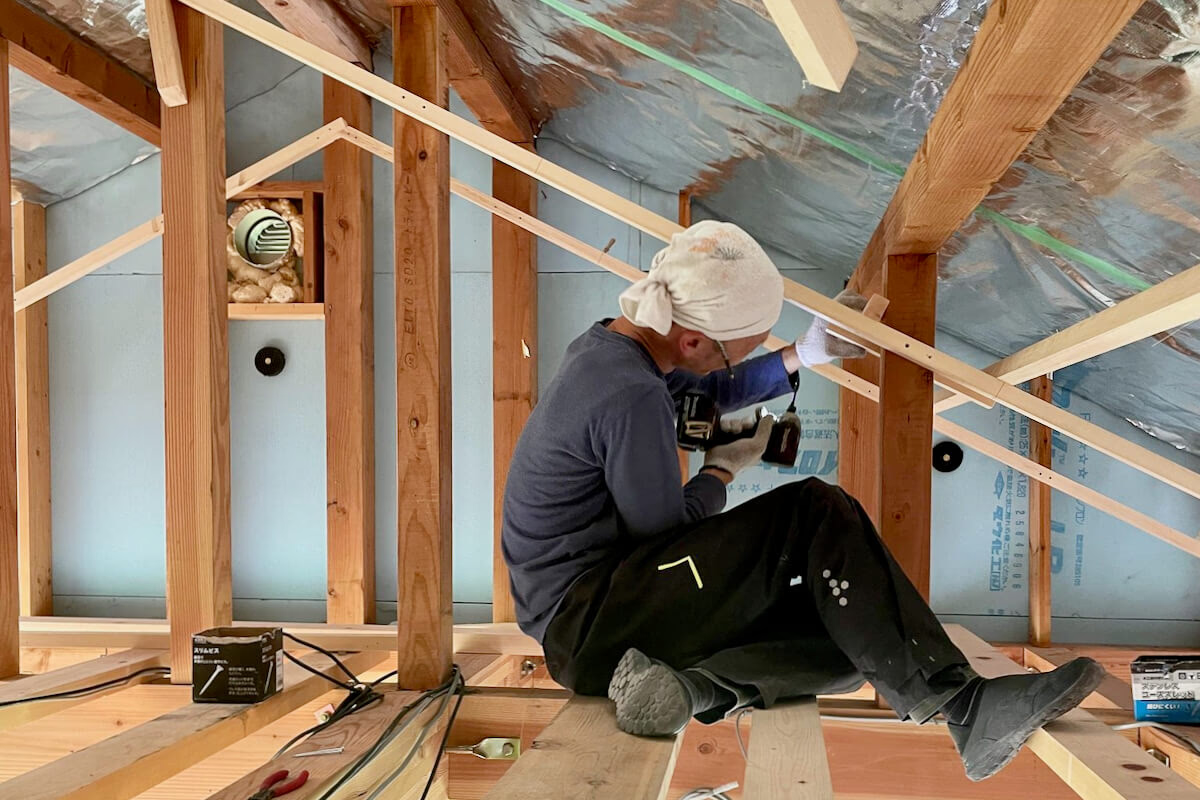
渡辺さんがご一緒している職人さん
提供したいのは、「自分でつくる」ことで自信を持ち、自分を認める体験
— 渡辺さんと馬場さんが何らかの形でコラボレーションするというのも考えられますか?
馬場
もし、サロンのみなさんの中にお庭について悩んでいる方がいて、こんなわたしで大丈夫だったら……。
渡辺
大丈夫ですよ! えんがわラボには「自分でつくりたい」と本気で思っている人たちが集まっているので。オンラインサロンの会費が高いと批判されることもあるんですけど、ある程度本気の人に入ってほしくて月額5000円という価格にしました。
そのおかげで本当につくりたいと思っている人たちが集まってくれているので、対象が建築だけではなくて庭にも広がっていったら、喜んでくれると思います。「一旦目標としていたウッドデッキはできたけど、次はどうしようかな」という人に対して、「じゃあそのウッドデッキ前の庭に手を入れませんか」と言って馬場ちゃんが出てくる、というのはすごくいいんじゃないでしょうか。
馬場
増えちゃった植物を株分けしたり、種を交換したり、そういうことがグループ内でできるといいなと思います。
渡辺
それはすごくいいですね。最近少しずつメンバー間で余った材料をシェアしたり、「1日手伝ってくれたら使い終わったこの道具を差し上げます」といったやりとりが生まれているのですが、植物でもそういうことができるとまたたのしくなりますね。
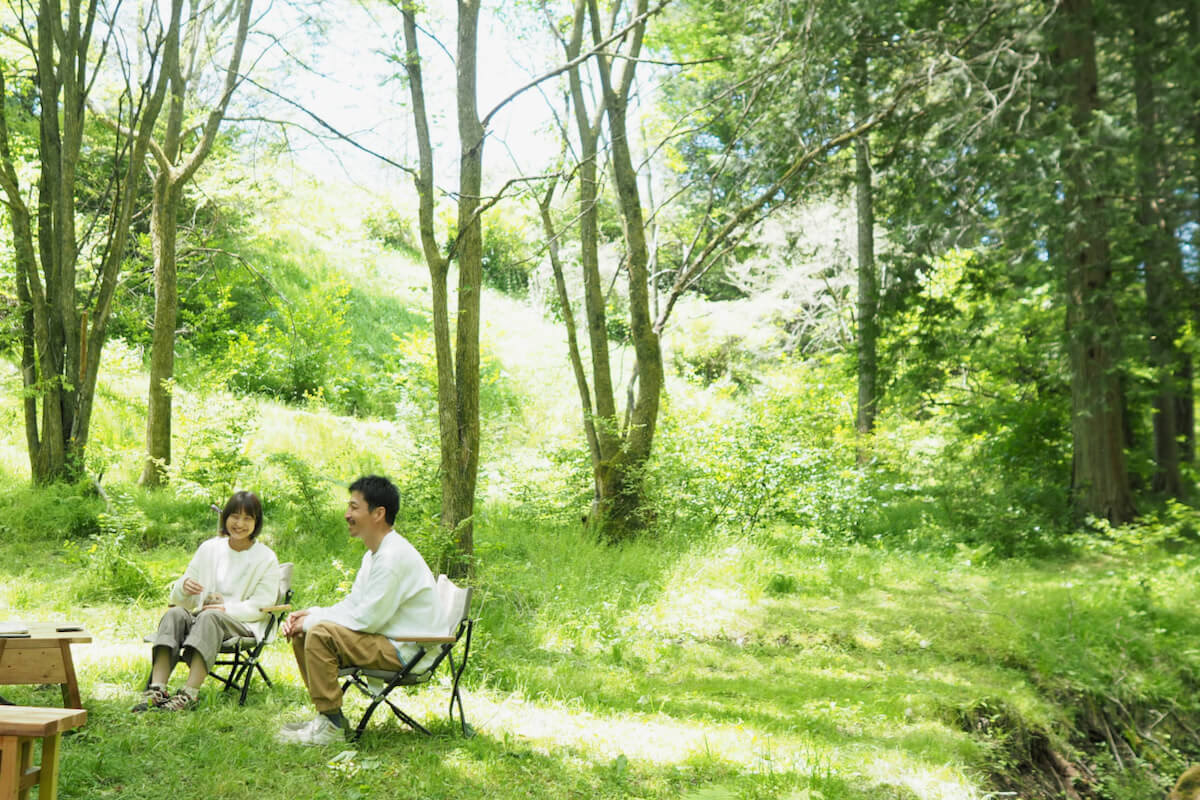
— いい形でコラボできそうですね。馬場さん、聞きたいことは聞けましたか?
馬場
はい! ……ただ、せっかく「めぐるモノサシ」のコーナーなので、渡辺さんの大事にしているモノサシはなにか最後に聞いてみたいです。
渡辺
そうだなぁ……。僕はセルフビルドパートナーと名乗っているけど、建築をやりたいのかと問われるとちょっと違うなと思うんです。最初に「セルフビルドの本質は自己満足」と言ったけど、僕自身が小屋をつくったことで救われたところがあって。
建築業界を一度離れたのは、「もう嫌だ」と思っちゃったからなんです。会社勤めや上司部下という人間関係が苦手で、人の目をすごく気にする人間だから過度に言うことを聞いちゃって。それが、自分でつくりあげることで、「俺もできるじゃん」と少しずつ自信を取り戻して、自分を認められるようになった。
だから、そういう気持ちや体験を提供したいというのが一番にあるんです。人が幸せに生きるために、「自分でつくることができる」というのはすごく大きいと思っているから、それを提供したい。モノサシと言えるかはわからないけど、大事にしていることですね。
建築は好きだからメインにやっているけど、必ずしも建築じゃなくてもいいと思っていて。なので、馬場ちゃんのように違った得意技を持っている人が仲間になってくれるのはうれしいです。いろんな分野の「自分でつくる」をサポートして、教わる側だったメンバーの方が教える側に回ったりもして。えんがわラボがそういう場になっていくといいなと思っています。
— ありがとうございます。これから「自分でつくること」をサポートしたいと思っている馬場さんが素直に質問してくれたことで、渡辺さんが工夫していることや大事にしていることがより深く聞けたなと思っています。おふたりのコラボレーションがもし形になったら、そのときはぜひまた取材させてください!
(対談ここまで)
対談を終えて。馬場から渡辺さんへ
今回対談をさせて頂いて、たくさんの気付きがあり、そして改めて自分とも向き合うことができました。
中でも一番印象に残った言葉は、「みんなやればいいのに」。
「みんなやればいいのに」と思いながらも、楽しいから自分で作り続けるという道もあると思います。
しかし、渡辺さんは、どうしたらやれるようになるのかを考えて実践されているのだなと思いました。
それも「みんなやろう!」と引っ張っていく感じではなくて、踏み出せないでいるような人に「じゃあ背中支えてるので、やってみましょう」と後押ししてくれるような感じ。
自転車に乗る練習をお手伝いするお父さんくらいの距離感なのかなと思いました。後ろで少し支えてて、頃合いを見て手を離す。
そう思ったら、物凄くしっくりきて、私もそういうのがやりたいんだ!と思ったのです。
サポートする人も正解を持ってる必要はなくて、やりたいと思っている人の中にあるものを引き出してあげる。
その一つが会話をすることで、「あっそうか。だから会話をすることは大事なのか。」と思いました。
というように、対談の内容を思い出しながらあれこれ考えていると止まらなくなってしまいます。
それほどヒントがたくさんあって、それこそ会話することの大切さを実感できた時間でした。
話を引き出しやすくしてくれる空気感や話題が逸れていっても、上手いこと繋げてくれるのはとても心地良くて、話が上手とかよりも、こういう空気感が会話には必要なのだなと思いました。
そういう力を渡辺さんは持っているのだと思います。
渡辺さんのような生き方をしている方にお会いできたこと、そして今回対談という形でゆっくりお話をさせて頂けたこと、本当にありがたく思っています。
いつかコラボできることを楽しみに、これからもどうぞよろしくお願いします。
馬場
